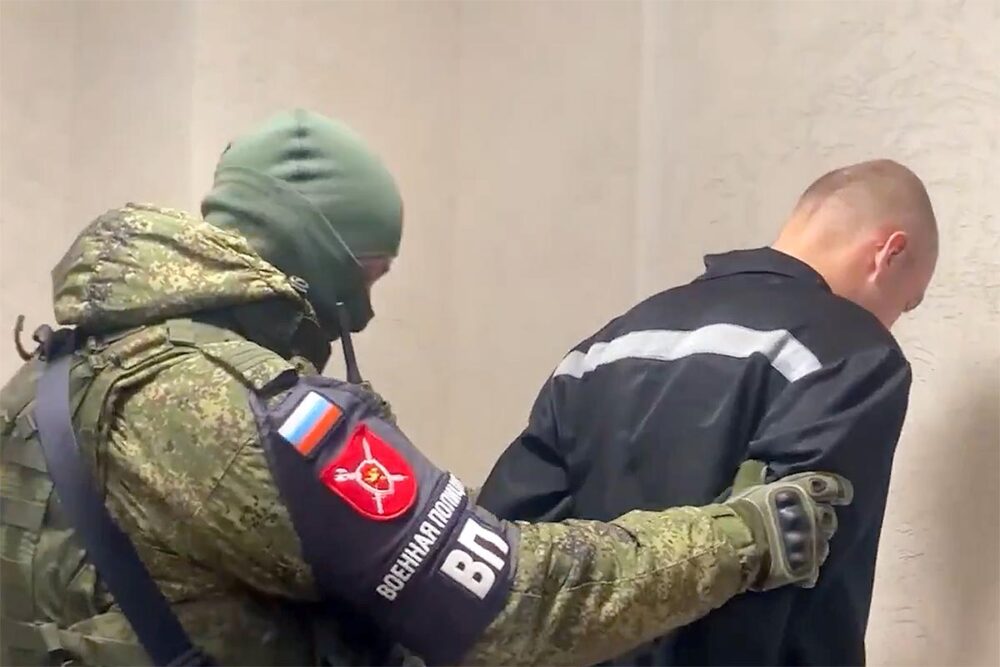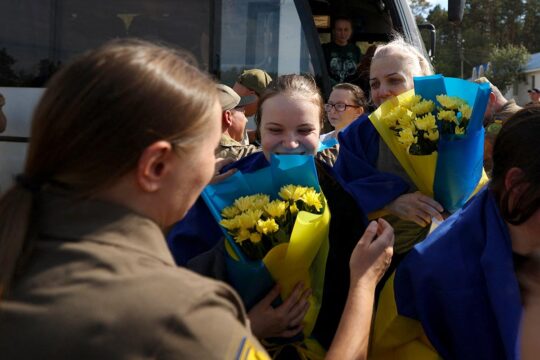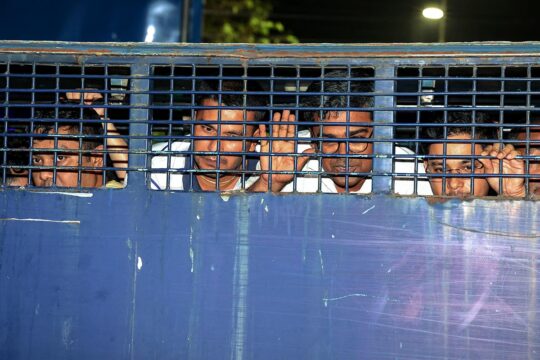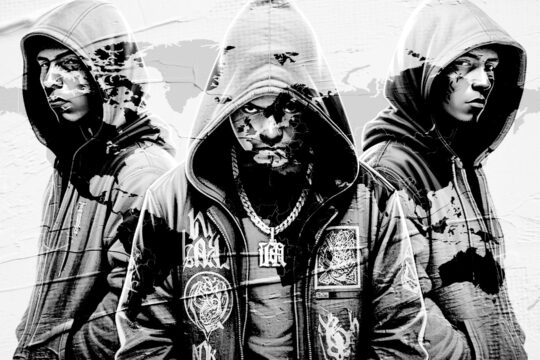This marks a significant shift from how Ukrainian soldiers were previously tried in Russia. More than 60 Ukrainian soldiers who took part in the incursion into Russia’s Kursk region last summer have been sentenced to between 14 and 26 years in prison. In nearly all cases, Russian courts classified their actions as acts of terrorism. Courts in the self-proclaimed Donetsk and Luhansk People’s Republics usually charged them with crimes such as mistreatment of civilians, using banned methods of warfare, and murder. Terrorism charges were far less common.
Ukrainian forces smashed on August 6, 2024 into the Kursk region, in south-west Russia, close to the Ukrainian border. According to various estimates, they seized control of between 1,000 and 1,300 square kilometres of land, up to 4.5% of the Kursk region’s total area of 29,900 sq. km. Ukraine hoped the operation would strengthen its position in potential negotiations. In early February 2025, Ukrainian President Volodymyr Zelensky said he “planned to offer Russia a direct territorial exchange”.
Since the autumn, the area under Ukrainian control has slowly decreased. The situation changed dramatically in early March 2025, when Russia launched a successful counterattack and regained control of Sudzha, the largest settlement held by Ukrainian forces. The latest battlefield map from Deep State, a Ukrainian platform that tracks frontline changes using open-source data, showed Ukraine controlled less than 78 square kilometres as of March 27.
Hundreds of soldiers captured
Over the seven months of fighting, hundreds of soldiers from both sides were taken prisoner, but the exact number remains unknown. In December 2024, Russia’s state news agency TASS, citing an unnamed source, reported that around 500 Ukrainian soldiers had been captured since August 6 last year.
Russia’s Investigative Committee opened the first criminal case related to the incursion into the Kursk region on August 7. The case was launched against unidentified individuals under charges including committing a terrorist act, murder, illegal possession of weapons and ammunition, and attempted murder of law enforcement officers, among others. This type of response is typical for Russian authorities and is often more of a political gesture aimed at signalling the seriousness of events that attract wide public attention. For example, similar cases against unidentified individuals are routinely opened after drone attacks on Russian territory.
The first actual criminal cases against Ukrainian soldiers captured in the Kursk region began reaching courts in the autumn. According to jurisdiction rules based on Russia’s military district court system, these cases were handled by the 2nd Western District Military Court, located in Moscow. Previously, cases involving prisoners of war from the Donetsk and Luhansk regions had been handled by the Southern District Military Court in Rostov-on-Don.
In most cases, judges from the 2nd Western District Military Court do not hold hearings in Moscow, but travel to the region where the crime was committed. That’s what happened with the trials of Ukrainian prisoners of war: at least some of the hearings took place in the building of the Kursk Regional Court.
From border crossing to terrorism charges
On March 21, the head of Russia’s Investigative Committee, Alexander Bastrykin, announced that courts had already sentenced 46 Ukrainian soldiers for crimes against civilians in the Kursk region. He added that trials for another 92 were ongoing, and 58 more were still under investigation.
Based on official statements and media reports, Justice Info was able to verify at least 67 sentences handed down by the 2nd Western District Military Court against soldiers captured in the Kursk region. These cases follow a familiar pattern seen in trials of prisoners of war: in the vast majority of them, the Investigative Committee classified the actions of Ukrainian soldiers as “terrorist acts with grave consequences.”
But this marks also a shift from earlier practices in trials of POWs in the self-declared Donetsk [DNR] and Luhansk [LNR] People’s Republics and in the Southern District Military Court. For example, in the DNR, in addition to terrorism, Ukrainian fighters were often charged with participating in illegal armed groups, sabotage, weapons smuggling, attempted murder of Russian troops, and the violent seizure of power.
The first verdict came on December 12, 2024, against two servicemen from Ukraine’s 61st Mechanized Brigade — Vitaly Panchenko and Ivan Dmitrakov. They were sentenced to 14 and 15 years in prison, respectively. According to the investigators, on August 7, 2024, the men illegally crossed the Russian border and later “repeatedly opened fire with the intent to kill both Russian soldiers and civilians.” They were captured on August 17 and 18. The head of Chechnya, Ramzan Kadyrov, claimed that the Akhmat special forces — made up of former Wagner Group fighters — were responsible for their capture.
Investigators also alleged that the Ukrainian soldiers threatened three Russian civilians with weapons and forced them into a truck before taking them across the border into Ukraine. In a short video published by the state news agency TASS in September, Panchenko said he hit one of the civilians on the shoulder during the loading process but could not explain why. At the end, he said: “I just want all this to end, and for everyone to go home. Yours and ours.”
Russian authorities also accused Panchenko of stealing food from a local grocery store in the town of Sudzha. The store — a branch of the Pyaterochka supermarket chain — became an informal symbol of Ukraine’s advance into the region. Photos of Ukrainian troops standing outside the store frequently appeared online. After Sudzha was recaptured by Russian forces, acting Kursk governor Alexander Khinshtein proposed preserving the damaged store building as a reminder of the “occupation.” The store had been looted inside and was covered in Ukrainian military graffiti on the outside.
Uniform charges, uniform punishment
The classification of these actions as terrorism appears to be driven primarily by political motives. For example, Russian President Vladimir Putin has repeatedly referred to all Ukrainian soldiers and foreign mercenaries fighting in the Kursk region as “terrorists.” This label allows Russia to treat them not as lawful combatants, and therefore to bypass the protections guaranteed by the Geneva Convention. In addition, terrorism-related charges under Russia’s criminal code automatically trigger harsher sentencing rules. For instance, the first few years of a sentence must be served in a prison where inmates are held in small groups under strict isolation — unlike standard correctional colonies.
The charges brought against Ukrainian POWs captured in the Kursk region were largely identical. Most were accused of entering the Sudzha and Korenevo districts, intimidating civilians, seizing residential homes, obstructing evacuations, and opening fire on both civilians and military personnel.
On average, courts sentenced them to 15 to 16 years in high-security colonies, with the first three years to be served in prison. The largest number of convictions involved soldiers from Ukraine’s 22nd and 44th Separate Mechanized Brigades and the 3rd Assault Brigade. Most of them were captured in August and September 2024.
Foreign fighters from US, UK, Lithuania and Georgia
Out of the 67 convictions documented, 11 were handed down to foreign nationals. Unlike Ukrainian soldiers, they were charged not only with committing terrorist acts but also with mercenary activity. Most of the foreign fighters were sentenced in absentia. U.S. citizens Daniel Bernard Rebar and Robert Wertman were sentenced to 25 and 23 years, respectively. Sharunas Jasyukevicius from Lithuania received 23 years, and New Zealander Jordan O’Brien was sentenced to 14 years in a high-security colony.
Several Georgian nationals were also convicted: Aleksi Bibichadze and Mikhail Baturin were each sentenced to 25 years; Georgy Kesarieli and Rati Burduli also received 25 years; Lasha Chigladze was sentenced to 24 years; and Levan Beruashvili to 24 years as well.
The only in-person trial of a foreign national was that of 22-year-old British citizen James Scott Rees Anderson, who had served in Ukraine’s International Legion. According to the Russian Investigative Committee, Anderson crossed into Russian territory armed and committed crimes against civilians to cause property damage and destabilize local authorities. He was sentenced to 19 years in prison, with the first five years to be served in a high-security prison. His trial was held behind closed doors.
The court said Anderson pleaded guilty and explained that he had joined the conflict for money. His lawyer asked the court to remove several aggravating circumstances and consider his confession and remorse as mitigating factors. In a video interrogation released on pro-Kremlin Telegram channels after his capture, Anderson claimed he had applied to the International Legion after losing his job. His father told British reporters that the family had tried to dissuade him from going to Ukraine, but he believed he was doing the right thing. He feared his son would be tortured in Russian captivity.
In March, a Russian representative in Vienna announced that the Investigative Committee had opened cases against more than 800 foreign nationals who had participated in the conflict on Ukraine’s side.
On March 14, U.S. President Donald Trump wrote that several thousand Ukrainian soldiers in the Kursk region were surrounded by Russian forces and called on Putin to “spare their lives.” Putin promised they would be “guaranteed safety” if they laid down their arms and surrendered voluntarily. The fate of these Ukrainian soldiers remains unknown.






